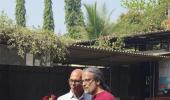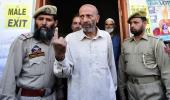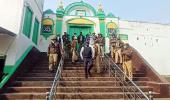Frowning upon the protracted trial in heinous offences, the Supreme Court has said indefinite incarceration would violate the expanded meaning of liberty under Article 21 of the Constitution as it granted reliefs to two alleged Maoist sympathisers, booked under the stringent anti-terror law UAPA.

Two different benches of the apex court granted relief to the accused after noting delayed trial. In one case, the trial was expedited while in the other, bail was granted by the top court.
A bench of Justices Surya Kant and N Kotiswar Singh said the Centre should seriously think of setting up special courts to try Maoist-related cases, so that the trial is expedited.
The bench, which was perturbed by the fact that even after six years of arrest Ning Kham Shangtam, accused of allegedly transporting ammunition and parts of AK-47 automatic rifles from Manipur to Bihar for banned organisation Tritiya Prastuti Committee, a splinter group of Communist Party of India-Maoist, only 59 witnesses out of 98 have been examined.
Additional Solicitor General Aishwarya Bhati, appearing for the National Investigation Agency, submitted that the court in which the trial is going on in Bihar, was a regular court and there are other matters which are dealt by it.
"It is true that the petitioner has spent nearly six years in custody and indefinite incarceration would undoubtedly violate the expanded meaning of liberty under Article 21 of the Constitution of India. However, taking into consideration the fact that the trial in the instant case can be concluded within a specified time-frame, we do not deem it necessary to go into the merits of the petitioner's claim at this stage...," the bench said in its February 13 order uploaded on Thursday.
It issued certain directions for expediting the trial in the case.
The bench directed the trial court, before whom the subject-trial is pending, is directed to take up the case at least twice in a month for recording the remainder of the prosecution evidence.
It directed the NIA and its public prosecutor to ensure that sufficient prosecution witnesses, who are yet to be examined, remain present for their deposition before the trial court.
"Counsel for the petitioner as well as his co-accused are directed to extend full cooperation to the trial court for expeditious disposal of the trial for which they will not seek avoidable adjournments for cross-examination etc," it said, adding that the trial court shall make an endeavour to conclude the pending trial within six months.
The bench said in case, the public prosecutor or defence counsel do not extend cooperation to the trial court, a report to this effect shall be sent to this court for appropriate directions.
"However, if for some unforeseen circumstances, beyond the control of the court, trial is not concluded within six months, liberty is granted to the petitioner to move a fresh application for bail before the trial court and such an application shall be considered as per its own merits without being influenced by the observations made in the impugned order of the high court or by this court," it said.
Similarly, a bench of Justices JP Pardiwala and R Mahadevan granted bail to one Tapas Kumar Palit, accused of allegedly transporting shoes, electric wires, LED lens, walkie-talkie and other articles for Naxal activities in Chhattisgarh.
The bench noted that Palit was arrested on March 24, 2020 and till now only 42 witnesses out of over 100 witnesses have been examined so far.
"If an accused is to get a final verdict after incarceration of six to seven years in jail as an undertrial prisoner, then, definitely, it could be said that his right to have a speedy trial under Article 21 of the Constitution has been infringed," it said.
The bench said it's been five years that accused has been in judicial custody and the state's counsel has no idea as regards the time likely to be consumed to complete the recording of the oral evidence.
"In such circumstances, we are left with no other option but to order release of the appellant on bail. We do not undermine the seriousness of the crime that has been alleged," the bench said in its order of February 14.
The bench said it has made clear many times that howsoever serious a crime may be the accused has a fundamental right of speedy trial as enshrined in Article 21 of the Constitution.
"Before we close this matter, we would like to observe as to why the public prosecutor wants to examine 100 witnesses. Who are these 100 witnesses? We are aware that it is the public prosecutor who could be said to be in-charge of the trial and he has to decide who is to be examined and who is to be dropped. But at the same time, no useful purpose would be served if 10 witnesses are examined to establish one particular fact," the bench observed.
It added that examining too many witnesses results in indefinite delay in conclusion of trial.
"It is expected of the public prosecutor to wisely exercise his discretion in so far as examination of the witnesses is concerned," the bench said, adding where the number of witnesses is large, it is not necessary that everyone should be examined.
"We would say that delays are bad for the accused and extremely bad for the victims, for Indian society and for the credibility of our justice system, which is valued," it said, while directing the accused not to enter Kanker district of Chhattisgarh.











 © 2025
© 2025